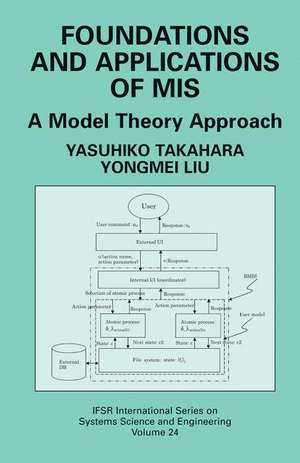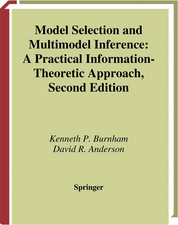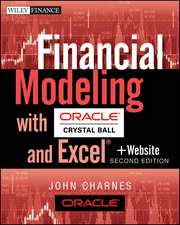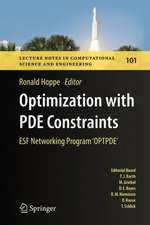Foundations and Applications of MIS: A Model Theory Approach: IFSR International Series in Systems Science and Systems Engineering, cartea 24
Autor Yasuhiko Takahara, Yongmei Liuen Limba Engleză Hardback – 28 sep 2006
The work presents an approach that provides a theoretical foundation for MIS development from the systems theoretic viewpoint along with practical applications ranging from a transaction processing system to a solver system. Both formal systems theory and automatic system generation based on the authors' newly extended Prolog offer a significant increase in the efficiency of specification, design and production of the application software, as well as an increase in the functional reliability of the software produced.
The book assumes a working knowledge of elementary set theory, logic, and familiarity with some systems concepts, such as the automaton model.
| Toate formatele și edițiile | Preț | Express |
|---|---|---|
| Paperback (1) | 1111.67 lei 6-8 săpt. | |
| Springer – 29 noi 2010 | 1111.67 lei 6-8 săpt. | |
| Hardback (1) | 1116.26 lei 6-8 săpt. | |
| Springer – 28 sep 2006 | 1116.26 lei 6-8 săpt. |
Din seria IFSR International Series in Systems Science and Systems Engineering
- 18%
 Preț: 955.70 lei
Preț: 955.70 lei - 18%
 Preț: 951.91 lei
Preț: 951.91 lei - 18%
 Preț: 1391.21 lei
Preț: 1391.21 lei - 18%
 Preț: 955.56 lei
Preț: 955.56 lei -
 Preț: 387.58 lei
Preț: 387.58 lei - 20%
 Preț: 994.73 lei
Preț: 994.73 lei - 18%
 Preț: 1132.33 lei
Preț: 1132.33 lei - 15%
 Preț: 637.59 lei
Preț: 637.59 lei - 15%
 Preț: 640.24 lei
Preț: 640.24 lei - 20%
 Preț: 989.79 lei
Preț: 989.79 lei - 18%
 Preț: 947.67 lei
Preț: 947.67 lei - 18%
 Preț: 953.03 lei
Preț: 953.03 lei - 15%
 Preț: 643.84 lei
Preț: 643.84 lei -
 Preț: 386.61 lei
Preț: 386.61 lei - 18%
 Preț: 1109.92 lei
Preț: 1109.92 lei - 20%
 Preț: 501.43 lei
Preț: 501.43 lei -
 Preț: 399.29 lei
Preț: 399.29 lei - 20%
 Preț: 644.48 lei
Preț: 644.48 lei -
 Preț: 391.40 lei
Preț: 391.40 lei - 15%
 Preț: 646.62 lei
Preț: 646.62 lei - 19%
 Preț: 447.27 lei
Preț: 447.27 lei -
 Preț: 388.52 lei
Preț: 388.52 lei - 18%
 Preț: 792.03 lei
Preț: 792.03 lei - 15%
 Preț: 648.42 lei
Preț: 648.42 lei - 18%
 Preț: 786.36 lei
Preț: 786.36 lei -
 Preț: 520.08 lei
Preț: 520.08 lei - 15%
 Preț: 643.00 lei
Preț: 643.00 lei
Preț: 1116.26 lei
Preț vechi: 1361.28 lei
-18% Nou
Puncte Express: 1674
Preț estimativ în valută:
213.62€ • 231.96$ • 179.44£
213.62€ • 231.96$ • 179.44£
Carte tipărită la comandă
Livrare economică 22 aprilie-06 mai
Preluare comenzi: 021 569.72.76
Specificații
ISBN-13: 9780387314143
ISBN-10: 0387314148
Pagini: 360
Ilustrații: XVI, 360 p.
Dimensiuni: 155 x 235 x 23 mm
Greutate: 0.66 kg
Ediția:2006
Editura: Springer
Colecția Springer
Seria IFSR International Series in Systems Science and Systems Engineering
Locul publicării:New York, NY, United States
ISBN-10: 0387314148
Pagini: 360
Ilustrații: XVI, 360 p.
Dimensiuni: 155 x 235 x 23 mm
Greutate: 0.66 kg
Ediția:2006
Editura: Springer
Colecția Springer
Seria IFSR International Series in Systems Science and Systems Engineering
Locul publicării:New York, NY, United States
Public țintă
ResearchCuprins
New Paradigm of Systems Development.- New Systems Development Methodology: The Model Theory Approach.- Model Construction Language and Systems Implementation Language.- Computer-Acceptable Set Theory for Model Construction.- Implementation Language: extProlog.- Model Theory Approach to Solver Systems Development.- Model Theory Approach to Solver System Development: Outlines.- User Model and Standardized Goal-Seeker.- Solver System Applications.- Traveling Salesman Problem: E-C-C Problem.- Regulation Problem: E-O-C Problem.- Linear Quadratic Optimization Problem: E-C-O and E-O-O Problems.- Cube Root Problem: I-C-C Problem.- Knapsack Problem: I-C-O Problem.- Class Schedule Problem: I-O-C Problem.- Data Mining Problem: I-O-O Problem.- Task Skeleton Model: Intelligent Data Mining System.- Model Theory Approach to Transaction Processing Systems Development.- Transaction Processing System on Browser-Based Standardized User Interface.- Browser-Based Intelligent Management Information System: Temporary Staff Recruitment System.- Database Connectivity for the Model Theory Approach.- Theoretical Basis for extProlog.- extProlog as Logic Programming Language.- Implementation of extProlog.
Textul de pe ultima copertă
Foundations and Applications of MIS presents a unique systems theory approach to management information system (MIS) development. The development is driven by the need to eliminate ambiguity in specification, design and construction of the application software. Further, the authors show that the considerable effort being expanded nowadays on validation, verification and testing, as required in current software engineering practices, will be reduced. The approach also reinforces the belief that MIS development is independent of software development.
The work presents an approach that provides a theoretical foundation for MIS development from the systems theoretic viewpoint along with practical applications ranging from a transaction processing system to a solver system. Both formal systems theory and automatic system generation based on the authors' newly extended Prolog offer a significant increase in the efficiency of specification, design and production of the application software, as well as an increase in the functional reliability of the software produced.
The book assumes a working knowledge of elementary set theory, logic, and familiarity with some systems concepts, such as the automaton model. Senior undergraduates and graduate students, researchers in management information systems, systems engineers and systems scientists will benefit from this book.
The work presents an approach that provides a theoretical foundation for MIS development from the systems theoretic viewpoint along with practical applications ranging from a transaction processing system to a solver system. Both formal systems theory and automatic system generation based on the authors' newly extended Prolog offer a significant increase in the efficiency of specification, design and production of the application software, as well as an increase in the functional reliability of the software produced.
The book assumes a working knowledge of elementary set theory, logic, and familiarity with some systems concepts, such as the automaton model. Senior undergraduates and graduate students, researchers in management information systems, systems engineers and systems scientists will benefit from this book.
Caracteristici
Presents a unique systems theoretic approach to MIS development Practical examples such as a transaction processing system and a solver system are discussed in detail Systematic presentation style














